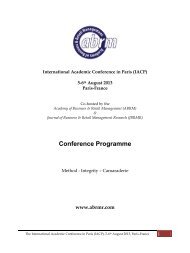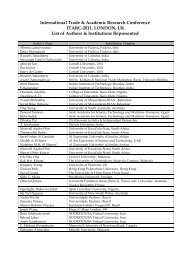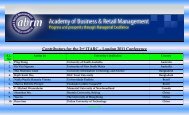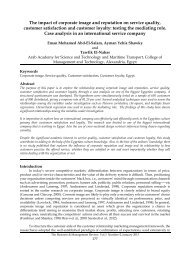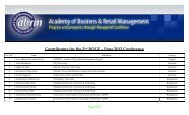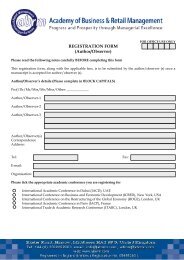ROGE - Pune 2011 - The Academy of Business and Retail ...
ROGE - Pune 2011 - The Academy of Business and Retail ...
ROGE - Pune 2011 - The Academy of Business and Retail ...
Create successful ePaper yourself
Turn your PDF publications into a flip-book with our unique Google optimized e-Paper software.
International Conference on the Restructuring <strong>of</strong> the Global Economy, PUNE 1-2 February, <strong>2011</strong><br />
11.30AM - 13.00AM<br />
Track: Leadership, Communication <strong>and</strong> International <strong>Business</strong><br />
Session Chair:: Pr<strong>of</strong>essor Gairik Das<br />
Room: Durbar Hall<br />
I. Transmission <strong>of</strong> Interest Rates Volatility: A Case Study <strong>of</strong> Upper Middle Class <strong>and</strong><br />
Lower Income Groups Countries<br />
Tarika Singh, Prestige Institute <strong>of</strong> Management, Gwalior, India,<br />
Seema Mehta, IIMH, Jaipur, India <strong>and</strong> Aarti Bajaj, Alumni PIMG, India<br />
Abstract<br />
With the development <strong>of</strong> liberalization <strong>of</strong> capital movements, an increasing<br />
attention has been given to international transmission <strong>of</strong> volatility to different market<br />
returns. This article empirically tests the effects <strong>of</strong> the volatility in the time value <strong>of</strong> the<br />
US t bills <strong>and</strong> RBI t bills on the developed, developing, <strong>and</strong> underdeveloped market.<br />
By using daily values <strong>of</strong> twelve equity markets <strong>and</strong> the interest rates on the 10 years<br />
treasury bills from 2000 to 2010, the Gaussian <strong>and</strong> Student’s-t GARCH models are<br />
tested to display the international Transmission effects <strong>of</strong> the US <strong>and</strong> Indian interest<br />
rates on the world equity markets. <strong>The</strong> empirical findings vary between the subeconomy<br />
groups. <strong>The</strong> equity markets in the upper, middle, <strong>and</strong> lower income group<br />
do not have strong interest rate effects. <strong>The</strong> markets are affected by the volatility in the<br />
US <strong>and</strong> RBI interest rates at low levels. On the other h<strong>and</strong>, impacts <strong>of</strong> the volatility in<br />
the US interest rates on the domestic money markets –i.e. bond spreads- in the<br />
emerging economies are stronger with negative direction.<br />
II.<br />
<strong>The</strong> Effects <strong>of</strong> TRIPS-IPR`s on Economic activities in Developing Countries<br />
Raghavendra R.N, Bangalore, Karnataka State, India<br />
Abstract<br />
TRIPS st<strong>and</strong> for Trade-Related Aspects <strong>of</strong> Intellectual Property Rights. It<br />
is one <strong>of</strong> the agreements signed at the end <strong>of</strong> the Uruguay Round <strong>of</strong> GATT<br />
Negotiations in 1995. It is widely accepted that knowledge is a prerequisite for<br />
development to take place in the current “knowledge economy”. This<br />
knowledge must be acquired, absorbed <strong>and</strong> diffused. An aspect which has<br />
generated much debate is the role that intellectual property rights (IPRs) can<br />
play as both enabler <strong>and</strong> inhibitor <strong>of</strong> the learning processes <strong>of</strong> knowledge<br />
acquisition, absorption <strong>and</strong> diffusion. On the one h<strong>and</strong>, holders <strong>of</strong> technology<br />
are reluctant to transfer their technology if they cannot be guaranteed<br />
protection against unauthorized <strong>and</strong> uncompensated use <strong>of</strong> the technology<br />
developed as a result <strong>of</strong> their investment. This means that the benefits <strong>of</strong><br />
accessing the technology are diluted. However, as acquired technology is<br />
mastered, technological capabilities are built up locally, facilitating increased<br />
indigenous innovation, which is in turn incentivized by IPRs.




